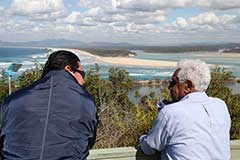Principle 11:
Indigenous people involved in research, or who may be affected by research, should benefit from, and not be disadvantaged by, the research project.
Research in Indigenous studies should benefit Indigenous peoples at a local level, and more generally.
Indigenous people who contribute traditional knowledge, practices and innovations, cultural expressions and intellectual property, skills, know-how, cultural products and expressions, and biological and genetic resources should receive fair and equal benefits.
A reciprocal benefit should accrue for allowing researchers access (often intimate) to personal and community knowledge.
Applying the principle
Discuss openly and negotiate with the community any potential benefits. Benefits may include financial payments such as royalties, as well as other benefits such as training, employment and community development.
Aim to make the benefits to the community or individual participants proportionate to the demands of their participation.
Where the benefits are not general (for example, employment opportunity or financial compensation), allocate benefits in cooperation with the group. Be prepared to pay those contributing to the research in recognition of the value of their contributions, particularly where significant time is given outside normal personal or community commitments.
Recognise that certain cultural information is owned and may need to be paid for.
Ensure that payments or financial benefits accruing to the participants are considered by an ethical review panel.
Provide all relevant information to Indigenous participants and communities to weigh potential benefits against possible risks or disadvantages.
Do not create or contribute to circumstances where exploitation of an economic, cultural or sexual nature can occur.
Consider benefits to Indigenous communities such as support for the archiving of materials relating to intangible cultural heritage, including (but not limited to) field notes and recordings that document language, cultural practices and ethnobotanical knowledge. Ensure that, if such benefits are provided, appropriate measures are in place to protect secrecy and confidentiality of materials.
Principle 12:
Research outcomes should include specific results that respond to the needs and interests of Indigenous people.
Research outcomes should respond to the needs and interests of Indigenous people, including those who participate in the project and others in the community who may be affected by the research. Among the tangible benefits that a community should be able to expect from a research project is the provision of research results in a form that is useful and accessible.
Researchers should be aware that research outcomes of interest to Indigenous peoples, including any community and individuals directly involved, may differ from those envisaged by researchers.
Applying the principle
Ascertain, during early consultations, the research needs of the community, if any, and opportunities for collaboration in research.
Be sure to build in the specific viewpoints of Indigenous people.
Incorporate research outcomes specific to the needs of Indigenous participants, the local community, Traditional Owners and other individuals as appropriate.
Recognise the broad range of educational backgrounds and experiences of Indigenous peoples and produce materials in accessible forms.
Provide an opportunity to discuss the significance of the results for the community with representatives and participants.
Be prepared to assist in the formulation of proposals for further research or related action by Indigenous participants, the local Indigenous community, other Indigenous individuals and
local Indigenous organisations.




